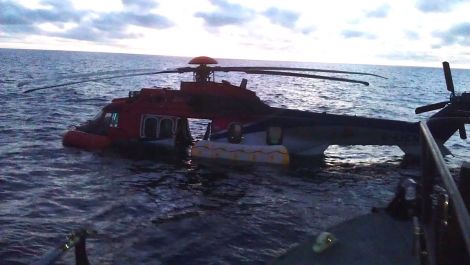News / Further safety calls after chopper ditchings
THE AIR Accident Investigation Branch is urging further research into the fatigue performance of high strength low alloy steel following two helicopter ditchings in the North Sea in 2012.
No one was seriously injured when an EC225 LP Super Puma with 19 people on board made an emergency landing into the sea off Fair Isle on 22 October 2012.
And 14 people escaped uiinjured when the same type of Super Puma ditched into the sea 32 miles off Aberdeen on 10 May 2012.
On both occasions the cause of the accidents has been identified as failure of the “bevel gear vertical shaft in the main rotor gearbox, which drives the oil pumps” due to corrosion.
In addition, due to an “incompatibility” in the wiring of the emergency lubrication system, a warning light indicated to the pilots that the back up for the lubrication system had also failed, so that the pilots had no option but to ditch the choppers immediately.
In theory, the pilots should have had 30 minutes of alternative cooling available to allow them to fly to the nearest airport.
In the event, the helicopters had 7:06 minutes and 8:55 minutes respectively from the loss of oil pressure to ditching.
All on board were rescued successfully but some passengers commented that life rafts were slow to deploy.
During the Shetland incident the mooring lines of one of the life rafts became entangled with rescue pack lines preventing the liferaft from being used.
Subsequently, the AAIB also recommends for the life raft manufacturer, Survitec Group Limited, revises the way it give clear instructions and diagrams on how to route the rescue pack lines and mooring pack lines when packing the life raft.
The agency further requires the manufacturer to “review the installation of the Type 18R MK3 liferaft in the EC225 sponson to ensure that there is a high degree of deployment in foreseeable sea conditions”.
Become a member of Shetland News
Jim Morris, a partner in the legal team representing victims of the October 2012 ditching, said: “This chain of serious issues that contributed to the ditching of both helicopters is very concerning – ultimately both ditchings should never have happened. Fortunately everyone survived but the passengers involved have suffered physical and serious psychological injuries as a result.
“There has been a worrying number of aviation incidents involving Super Puma helicopters in recent years and we know from working on behalf of victims that the demand for change and flight safety improvements is high. It is vital that the aviation industry learns from these incidents.
“The report indicates that the helicopter manufacturer has taken measures to prevent corrosion inside the bevel gear shaft and is in the process of redesigning the shaft and, in addition, has made modifications to the emergency lubrication system.
“As such, it is hoped that these measures taken by the manufacturer will ensure that similar failures are prevented from occurring again.
The full report can be found on the AAIB website.
Become a member of Shetland News
Shetland News is asking its many readers to consider paying for membership to get additional features and services: -
- Remove non-local ads;
- Bookmark posts to read later;
- Exclusive curated weekly newsletter;
- Hide membership messages;
- Comments open for discussion.
If you appreciate what we do and feel strongly about impartial local journalism, then please become a member of Shetland News by either making a single payment, or setting up a monthly, quarterly or yearly subscription.

























































